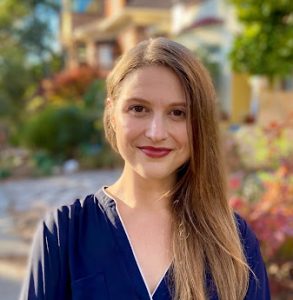
I strive to make each session with my clients feel useful and helpful. I am very engaged in the session and will share key takeaways that provide concrete steps for growth and healing. Therapy should be a completely safe space where one can be 100% authentic and met with understanding. As a therapist, I am always in my client’s corner, helping them navigate the highs and lows of life.
I enjoy and have extensive experience helping those who struggle with disordered eating and poor body image. My clients have told me that our work together has helped them gain freedom from being controlled and pushed around by the critical thoughts in their heads and unhealthy behaviors.
Additionally, I have helped many clients who suffer from stress, anxiety, obsessive thinking, self-criticism, sadness, emptiness, and lack of motivation. After working together, they have expressed feeling more empowered to deal with these internal struggles and with life’s challenges. They were able to learn and practice the tools necessary to help heal from traumatic experiences.
I appreciate when a client feels ready to explore their identity and examine the impact of problematic societal messages. It’s amazing to see the transformation in confidence and resilience that comes forth from this work.
My Why
With the complexities, stressors, and traumas that exist in our world, we do our best to cope. The coping mechanisms we develop may be effective at one time in life, but later can lead us to unhelpful patterns. Before we know it, we may find ourselves trapped in cycles of suffering.
Through my personal and professional experiences, I have witnessed how powerful psychotherapy can be in helping people gain freedom from unhelpful patterns. People can develop new perspectives and tools that promote change and healing. I feel fortunate to do this meaningful and satisfying work.
How I work
I prioritize building trust and respect with my clients, as I believe this foundation must exist for change to occur. I use culturally sensitive psychodynamic theory to help people identify patterns that may or may not serve them. In doing this, I consider childhood events and social context as shapers of people’s strengths and struggles.
I often attend to the “here and now,” addressing emotions that actively emerge during the therapy sessions. I integrate this work with neurobiological research, cognitive behavioral therapy (CBT), and dialectical behavioral therapy (DBT) to provide education and concrete tools that help people with day-to-day struggles.
My work is strongly informed by cultural humility, meaning that I respect and honor my clients’ diverse identities, understanding that they are the experts on their cultures and experiences. I welcome diverse people, including but not limited to all ethnicities, gender identities, sexual orientations, body sizes and shapes, nationalities, socio-economic levels, and religions.
License & Education
- Clinical Psychologist licensed by the California Board of Psychology, PSY32115
- Doctor of Psychology, The Wright Institute, 2019
- Master of Psychology, The Wright Institute, 2015
- Bachelor of the Arts, Wheaton College (MA), 2009
Training & Clinical Experience
I obtained my doctor of psychology degree (Psy.D.) from the Wright Institute in Berkeley. Over the course of my studies, I provided psychotherapy and assessment at various community mental health and school-based organizations. I then completed an American Psychological Association (APA) accredited internship at the Ann Martin Center, and a postdoctoral fellowship at Access Institute for Psychological Services.
Throughout these experiences, I received training in contemporary models of psychotherapy and assessment for children, teens, and adults with a wide variety of struggles and needs. Later, I worked as a psychotherapist at the Healthy Teen Project in San Francisco, which is a partial hospitalization and intensive outpatient program for adolescents with eating disorders and co-occurring mental health struggles.
Additionally, I have completed eating disorder treatment training from organizations such as the International Association of Eating Disorders and the Training Institute for Child and Adolescent Eating Disorders. I believe psychotherapists should always be learning and growing, so I consistently pursue continuing education and consultation with expert clinicians.
I have experience providing psychotherapy to Spanish/English bilingual/bicultural clients. This work is supported by my fluency in Spanish and living and working in Puebla, Mexico.
Professional Affiliations
- International Association of Eating Disorder Professionals (IAEDP)
- Psychoanalytic Institute of Northern California (PINC), Community Member


